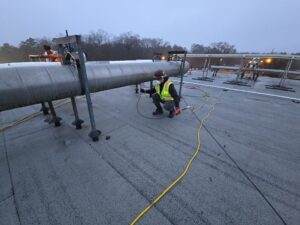Do you know how much money you could save with regular HVAC maintenance? Many people don’t realize how important it is until they see their energy bills skyrocket or need costly repairs. A bit of care upfront can make your HVAC system work better, saving you money and keeping you comfortable.
Let’s explore some expert HVAC maintenance tips. We’ll see how keeping your system in good shape can make your home healthier.
Key Takeaways
- Schedule professional HVAC maintenance twice a year—in spring for AC and in fall for the furnace.
- Replace filters every few months to maintain optimal system efficiency and airflow.
- Set your thermostat to 78 degrees Fahrenheit in summer and 68 degrees Fahrenheit in winter for efficient temperature management.
- Regularly changing the air filter can significantly improve indoor air quality.
- Keep at least 12 inches of space around the condenser unit to promote proper airflow.
- Cleaning the condensate drain line every three months can prevent algae and debris buildup.
Understanding the Importance of HVAC Maintenance
Keeping your HVAC system in good shape is key for its long life and efficiency. Regular maintenance can cut your energy bills by up to 30%. This is a big savings that can help your monthly bills.
The U.S. Department of Energy agrees. It says that keeping your HVAC well-maintained can cut down on electricity and gas use by up to 30%. This means big savings over time.
Why HVAC Maintenance Matters
Regular HVAC checks are very important. It’s wise to schedule maintenance twice a year. This meets the warranty needs of HVAC makers and can prevent up to 75% of warranty claims.
Also, regular maintenance can make your HVAC system last up to 40% longer. It helps find problems early. This ensures your system works well, even when it’s busiest.
Common HVAC Problems Caused by Neglect
Ignoring HVAC maintenance can cause many issues. Dirty air filters can lower indoor air quality and may cause breathing problems. About 20% of AC breakdowns are due to lack of maintenance.
Also, around 50% of homes with gas appliances risk carbon monoxide leaks without regular checks. An old, dirty HVAC system will get clogged with debris. This reduces airflow and increases energy use, raising your costs.
Regular HVAC checks include detailed 32-point checklists for air conditioners and 20-point checklists for heating parts. These thorough inspections can spot up to 70% of problems early. This prevents small issues from becoming expensive repairs. In short, regular maintenance can save homeowners about 30% on repair costs by catching problems early.
Signs Your HVAC System Needs Attention
Spotting early signs that your HVAC system needs help can prevent bigger problems later. Regular HVAC tune-up and timely air conditioning service keep your home comfy and efficient. Here’s what to watch for:
Unusual Noises and Smells
Bad smells and odd noises are warning signs. Sounds like squealing or banging might mean mechanical problems. Unusual smells could be mold or mildew, harming your air quality and comfort.
In up to 75% of cases, these smells point to a big issue that needs a pro’s look.
Inconsistent Temperature Levels
Uneven heating or cooling in rooms might mean ductwork or insulation issues. About 30% of homes face this, often due to inefficiencies. A good HVAC tune-up can fix these problems.
Remember, frequent cycling can shorten your system’s life by up to 50%. So, fixing these issues is key.
Increased Energy Bills
A sudden jump in energy bills could mean your HVAC system isn’t working right. Systems that aren’t maintained well can use 20-30% more energy. Clogged filters or poor airflow can add another 10-30% to costs.
Regular air conditioning service can stop these problems and keep your bills down.
Seasonal HVAC Maintenance Checklist
Keeping your HVAC system in top shape all year is key for best performance and energy use. Use a detailed HVAC maintenance checklist to get your heating and cooling ready for each season.
Spring and Summer Tasks
When it gets warmer, focus on getting your cooling systems ready. An annual check-up before the season starts can save you money and headaches. Clean the air conditioning coils to avoid inefficiency and high costs.
Check the refrigerant levels too. Low levels can make your system work harder and cost more. Also, keep an eye on the condensate drain to avoid water damage and humidity issues. Make sure air flows well to avoid up to 15% efficiency loss.
Fall and Winter Tasks
In the cooler months, it’s time to look after your heating system. A fall check-up can help you avoid busy contractor schedules. Check gas or oil connections to prevent fires and health risks.
Don’t forget to lubricate moving parts to avoid friction and high electricity bills. Watch out for electrical issues, as they can shorten your HVAC’s life. Pre-season checks can spot problems like leaks and rust, preventing bigger issues. Learn more about winter HVAC tune-ups to keep your system safe during the cold.
Tips for Year-Round Care
Regular care all year is essential for a reliable and efficient HVAC system. Change air filters every 30 to 90 days to boost efficiency and prevent early failure. Set your thermostat right to save energy, like when you’re not home.
Regular maintenance can cut your energy costs by 5% to 40%. Seasonal care can reduce breakdowns by up to 30%. Properly lubricated parts can save about 10% on energy each year. Stick to a thorough HVAC maintenance checklist to keep your home comfortable and bills low.
DIY HVAC Maintenance Tips for Homeowners
Keeping your HVAC system in good shape is key for comfort and saving energy. DIY maintenance can extend your system’s life, improve air quality, and cut down on energy costs. Here are some easy tips to help:
Changing Air Filters
Changing your air filters regularly is a simple yet powerful step. Doing so every 1-3 months can boost system efficiency by up to 15%. This can lower energy use.
Dirtier filters can make your system work harder, using more energy. This can shorten its life by up to 15%.
Cleaning Ducts and Vents
Clogged ducts and vents can cut your system’s efficiency by up to 30%. They also lead to poor air quality, which can be 2-5 times worse than outside air. Cleaning vents and ducts regularly keeps airflow optimal and saves energy.
Don’t forget to clean your outdoor units too. This can cut energy use by 10-15%.
Checking Thermostat Settings
Your thermostat is critical for maintaining your HVAC system. Make sure it’s set correctly to avoid overworking your system. Using a programmable thermostat can save you 10-15% on energy bills.
By following these DIY maintenance tips, you can keep your HVAC system running well all year. Regular checks and upkeep can add 5-10 years to your unit’s life. This also means better air quality and lower energy bills.
When to Call a Professional for HVAC Help
Knowing when to call a pro for your HVAC system is key. Regular maintenance can solve many problems. But, some issues need a certified tech to fix right.
Understanding Repair Needs
Your HVAC might need a pro for many reasons. This includes strange noises, smells, or temperature changes. Fixing these early can save you a lot of money, with costs between $300 to $1,000 for big fixes.
Also, if your energy bills suddenly jump by 20-30%, your system might be struggling. This is a clear sign you need help fast.
One common problem is an imbalance of refrigerant in the compressor. This messes up cooling. Heat pumps, for example, can last up to 20 years. Skipping maintenance can make them less efficient and cost more to run.
Almost 90% of central air service calls are because of water leaks. This shows how important it is to have a skilled pro.
Finding a Trusted HVAC Technician
Looking for a reliable HVAC tech? Make sure they’re certified. About 80% of HVAC contractors are certified by groups like NATE.
Getting quotes from at least three contractors helps you find the best deal. This way, you know you’re getting quality service for a fair price.
Scheduling HVAC service in the off-season can save you money. Regular maintenance, done at least once a year, can boost your system’s efficiency by 5-15%. It also keeps your warranty valid and prevents big, expensive problems.
In short, taking care of your HVAC and knowing when to call a pro saves you time, stress, and money. With the right technician, your home will be comfy all year.
The Benefits of Regular HVAC Maintenance
Regular HVAC maintenance is key to keeping your heating and cooling systems running smoothly. It prevents sudden breakdowns and cuts down on energy costs and environmental impact. Working closely with your HVAC contractor through regular visits can also improve communication and give you peace of mind.
Improved Energy Efficiency
One big plus of heating and cooling maintenance is better energy use. Studies show it can make your system up to 30% more efficient. This means lower energy bills and less environmental harm.
Dirty coils can cut your system’s power by 20% to 40%. So, keeping everything clean is vital. It helps your system work less hard, saving you money on energy.
Extended Lifespan of Your System
Regular checks also make your HVAC system last longer. A well-cared-for system can go 10-15 years without needing a replacement. This is compared to a neglected system that might not last as long.
Regular maintenance can also cut down on breakdowns by 50%. This saves you from expensive repairs. Plus, it keeps your system reliable, even in extreme weather.
Keeping up with a maintenance schedule improves your system’s performance. It also cuts down on indoor pollutants by about 50%. This is important because we spend most of our time indoors, where pollutants can be higher.
In the U.S., 76 million homes use central air-conditioning. Neglecting maintenance can make your system work harder, using up to 25% more energy. But, regular maintenance can stop up to 90% of HVAC problems. This keeps your home comfortable all year.
Eco-Friendly HVAC Maintenance Practices
The move towards green HVAC maintenance is essential, not just a trend. Eco-friendly HVAC practices cut down energy use and environmental harm. Here’s how you can help make the future greener while keeping your HVAC in top shape.
Benefits of Energy-Efficient Systems
HVAC systems use a lot of energy, making up about 40% of building energy use. Choosing high-efficiency models like air-source heat pumps can cut heating energy use by 50%. Geothermal heat pumps are even better, with efficiency ratings between 300% and 600%.
Smart thermostats can save 10% to 12% on heating and cooling costs. They also cut down on greenhouse gas emissions. Solar-powered HVAC systems can use up to 75% less fossil fuel.
Sustainable Maintenance Options
Regular HVAC preventative maintenance is key to keeping your system running well. Changing filters and cleaning ducts can boost efficiency by 15%. This cuts down on energy waste and emissions, making the air cleaner.
Using energy-efficient systems and methods like ERV systems can save up to 20% on energy. Ductless mini-split systems are also more efficient, losing up to 30% less energy than traditional setups.
High-efficiency furnaces with AFUE ratings of 90-98% can save a lot of energy. They use 20% to 50% less energy than older models. This means big savings on energy costs over time.
Preparing Your HVAC System for Extreme Weather
Extreme weather can harm your HVAC system. It’s important to prepare it for both longevity and energy efficiency. A detailed HVAC maintenance checklist and regular tune-ups can help prevent damage and ensure your system works well all year.
Winterization Tips
Winter weather is tough on HVAC systems. Heavy snow and cold temperatures are risks. Insulating pipes and ducts helps prevent heat loss and keeps your system efficient.
Using weatherstripping around doors and windows also helps. It keeps your home insulated and reduces the load on your HVAC system.
In areas like Mobile-Pensacola and New Orleans, flooding is a concern. Installing a basement waterproofing system is key. It includes sump pumps and floor drains to protect your HVAC from flood damage. Regular tune-ups and checks on belts, motors, and refrigerant levels are also important.
Summer Readiness Checklist
Summer heat can make your HVAC system work too hard. Replacing or cleaning air filters every 1-3 months helps prevent overheating. Keeping outdoor units clean and protected from debris and wind is also important.
Having a portable generator during power outages is essential. It provides enough power for essential appliances. Installing a surge protector also protects your HVAC from electrical surges. For more tips, check out this guide on preparing your HVAC system for severe weather.
Regular HVAC maintenance inspections are key. Do them at least twice a year, before summer and winter. This keeps your system ready for extreme weather, extends its life, and keeps it efficient. Following a good maintenance checklist can also prevent system failures and expensive repairs.
The Role of Indoor Air Quality in HVAC Maintenance
Indoor air quality (IAQ) is key to a healthy home. The U.S. Environmental Protection Agency (EPA) says we spend 87% of our time indoors. Poor IAQ can cause health problems like breathing issues and heart diseases. Keeping your HVAC system in good shape helps filter out bad stuff and brings in fresh air.
Monitoring Humidity Levels
Humidity affects IAQ a lot. Too much humidity, over 60%, can lead to mold and dust mites. These can cause health issues like asthma. On the other hand, not enough humidity lets viruses and bacteria spread.
It’s important to keep humidity levels right with your HVAC. The Occupational Safety and Health Administration (OSHA) says too much dust can harm your health. A well-maintained HVAC system helps avoid this.
Choosing the Right Air Purifier
An air purifier adds extra protection by catching dust, pollen, and mold. Good air filters can even catch tiny pollutants. HVAC systems with UV lights kill germs, making the air cleaner.
For worries about chemical smells from products, air purifiers with activated carbon help. Remember, clean your air ducts every 3 to 5 years and change filters every 30 days. This keeps your air healthy.
Good HVAC maintenance keeps your system running well and your home healthy. By watching humidity and using air purifiers, you improve your home’s air. Regular checks, at least once a year, keep your HVAC in top shape.





